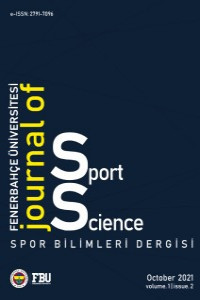SPORDA PSİKOLOJİK SÖZLEŞME İLE BİLİŞSEL DUYGU DÜZENLEME ARASINDAKİ İLİŞKİLER
Bu çalışma; sporda psikolojik sözleşme ile bilişsel duygu düzenleme arasındaki ilişkilerin incelenmesi amacıyla gerçekleştirilmiştir. Amaç doğrultusunda bilişsel duygu düzenleme ölçeği ve psikolojik sözleşme ölçeğinden oluşan veri toplama aracı , yıldız ve genç takımlarda oynayan 300 basketbolcu ve 300 futbolcu olmak üzere toplam 600 kişiye uygulanmıştır. Elde edilen veriler bilgisayar ortamında SPSS 22.0 programı aracılığı ile değerlendirilmiştir. Araştırma sonucunda bilişsel duygu düzenleme ölçeğinde bulunan tüm boyutlar ile genel psikolojik sözleşme ve işlemsel psikolojik sözleşme arasında düşük düzeyde pozitif yönlü ilişkiler saptanırken, olumlu yeniden odaklanma ve diğerlerini suçlama alt boyutları ile ilişkisel psikolojik sözleşme arasında anlamlı ilişkilerin olmadığı, diğer bilişsel duygu düzenleme boyutları ile ilişkisel psikolojik sözleşme arasında da düşük düzeyde pozitif yönlü anlamlı ilişkiler saptanmıştır. Yapılan regresyon analizi sonucunda ise; bilişsel duygu düzenleme ölçeğinde yer alan boyutlardan plan yapmaya yeniden odaklanma ve felaketleştirme genel psikolojik sözleşmeyi olumlu etkileyerek %18,9 düzeyinde artırdığı, diğer bilişsel duygu düzenleme boyutlarının ise genel psikolojik sözleşme üzerinde etkisinin olmadığı sonucuna ulaşılmıştır.
Anahtar Kelimeler:
Bilişsel Düzenleme, Psikolojik Sözleşme, Basketbol, Futbol
THE RELATIONSHIP BETWEEN PSYCHOLOGICAL CONTRACT AND COGNITIVE EMOTION REGULATION IN SPORT
This study was conducted to examine the relationship between psychological contract and cognitive emotion regulation in sport. For this purpose, the data collection tool consisting of cognitive emotion regulation scale and psychological contract scale was applied to a total of 600 people, including 300 basketball players and 300 football players playing in star and youth teams. The data obtained were evaluated by means of SPSS 22.0 programme in computer environment. As a result of the research, low level positive relationships were found between all dimensions in the cognitive emotion regulation scale and general psychological contract and transactional psychological contract, while no significant relationships were found between positive refocusing and blaming others sub-dimensions and relational psychological contract, and low level positive relationships were found between other cognitive emotion regulation dimensions and relational psychological contract. As a result of the regression analysis, it was concluded that refocusing on planning and catastrophising, which are the dimensions in the cognitive emotion regulation scale, positively affected the general psychological contract and increased it by 18.9%, while other cognitive emotion regulation dimensions had no effect on the general psychological contract.
Keywords:
Cognitive Regulation, Psychological Contract, Basketball, Football,
___
- Beedie, C.J., Terry, P.C. ve Lane, A.M. (2000). The profile of mood states and athletic performance: Two meta-analyses. Journal of Applied Sport Psychology, 12(1), 49–68. doi: 10.1080/10413200008404213.
- Botterill, C. ve Patrick, T. (2003). Understanding and managing emotions in team sports. In R. Lidor & K. P.
- Henschen (Eds.), The psychology of team sports (115-130). University of Michigan: Fitness Information Technology.
- Büyüköztürk, Ş., Kılıç Çakmak, E., Akgün, Ö. E., Karadeniz, Ş. ve Demirel, F. (2018). Bilimsel Araştırma Yöntemleri (24. baskı). Ankara: Pegem Akademi Yayınları.
- Campo, M., Laborde, S., & Weckemann, S. (2015). Emotional intelligence training: Implications for performance and health. In A. M. Columbus (Ed.). Advances in psychology research (75–92). Hauppauge, NY: Nova Science Publishers.
- Campo, M., Mellalieu, S., Ferrand, C., Martinent, G. ve Rosnet, E. (2012). Emotions in team contact sports: A systematic review. The Sport Psychologist, 26(1), 62–97.
- Cerin, E., Szabo, A., Hunt, N. ve Williams, C. (2000). Temporal patterning of competitive emotions: A critical review. Journal of Sports Sciences, 18(8), 605–626. https://doi. org/10.1080/02640410050082314.
- Cohen, A. B., Tenenbaum, G. ve English, R. W. (2006). Emotions and golf performance: An IZOF-based applied sport psychology case study. Behaviour Modification, 30, 259280. doi:10.1177/0145445503261174
- Başlangıç: 2021
- Yayıncı: Fenerbahçe Üniversitesi
